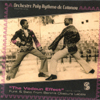 Germany's Analog Africa unleashes yet another amazing collection of long-lost African funk recordings. This, the follow-up to last year's uniformly beloved African Scream Contest, focuses entirely on Benin's staggeringly prolific (and largely unheard) Orchestre Poly-Rythmo de Cotonou.
Germany's Analog Africa unleashes yet another amazing collection of long-lost African funk recordings. This, the follow-up to last year's uniformly beloved African Scream Contest, focuses entirely on Benin's staggeringly prolific (and largely unheard) Orchestre Poly-Rythmo de Cotonou.
During the course of several trips to Benin, Analog Africa's tireless record-collector Samy Ben Redjeb compiled several hundred tracks recorded by Orchestre Poly-Rythmo de Cotonou between 1970-1983. This is the first of two expected compilations and focuses entirely on "secret" recordings that the band made on small labels while under an exclusive contract to Albarika Store. All of the tracks were originally issued in very limited pressings and only one has ever been released outside the band's home country. The music is uniformly raw and underproduced (in a good, visceral way), largely because the covert and budget-impaired nature of the releases necessitated that they be recorded in private homes with only one or two microphones.
It is difficult to pick a stand-out track, as they are nearly all uniformly solid. Nevertheless, I'm quite fond of "Dis Moi La Verité," despite the fact that it eschews any African percussion influence. This handicap is easily overcome by the tight and infectious bass line, and the call-and-response vocals are quite catchy. "Mi Homlan Dadalé" plays much more to the band's strength of wild and unusual percussion and is probably my favorite.
It is obvious why Redjeb decided to devote so much time and effort to making these recordings available, as the band has a rather unique sound and they are consistently excellent. There are many similarities to Senegal's Etoile de Dakar, especially the clean, simple guitar lines and and the Latin-tinged percussion. However, the Orchestre is much more bass-heavy and rhythmically complex (as well as quirky and varied). Or course, the occasional flourishes of endearingly clumsy and weird psychedelic organ are a large part of their charm too. Regrettably, the Orchestre lacks a frontman with the presence and star-power of Etoile's Youssou N'Dour, which may be at least partly to blame for their comparative obscurity. That said, the vocals certainly aren't bad, just not particularly charismatic or unique (and early N'Dour can be off-puttingly over-the-top sometimes anyway). In fact, a prominent vocalist might actually have been a liability for these guys, as it it is the groove that takes center stage, not the songwriting.
Yet another reason for the band's singular sound is that Benin is the birthplace of Vodun (or voodoo) and the band makes inspired and inventive use of its complex, ritualistic percussion. The band reference a number of traditional Beninese rhythms here, but they all invariably wind up incorporated into lively, propulsive grooves. Interestingly, one of the primary rhythms deployed here is Sakpata, which is dedicated to a deity known primarily for protecting people from smallpox. I do not currently have smallpox, so I was regrettably unable to test its effectiveness. Nevertheless, it is certainly refreshing for funk to take such a humaintarian and healthy turn (especially given the lengthy wake of unwanted pregancies and venereal diseases that American funk has presumably left behind it).
Redjeb seems to have preternatural and unerring good taste, as the two streaming mixes posted on his blog are no less impressive (and obscure). It is frustrating that releases are so slow to trickle out of his label, given the seemingly endless vein of material. Of course, I'm sure finding the recordings, sifting through them all, tracking down the bands, writing exhaustive liner notes, and securing the necessary rights are all very time-consuming and non-lucrative endeavors. Consequently, my impatience and gluttony is tempered by my deep appreciation for Redjeb's devotion and energy. I can't wait to hear what he releases next.
samples:
Read More

